Join or Sign In
Sign in to customize your TV listings
By joining TV Guide, you agree to our Terms of Use and acknowledge the data practices in our Privacy Policy.
Every Episode of The Last of Us, Ranked
From the ones that shambled to the ones that really clicked

Pedro Pascal and Bella Ramsey, The Last of Us
Liane Hentscher/HBOThe Last of Us traveled a long way in its first season. On screen, Pedro Pascal's Joel and Bella Ramsey's Ellie took a brutal cross-country journey — on foot, on horseback, and sometimes behind the wheel — from Boston to Salt Lake City, and the show left them changed by their trek. Episodically, Craig Mazin and Neil Druckmann's HBO drama changed too, beginning in apocalyptic crisis mode and gradually narrowing its focus to the relationship between a hardened man and his surrogate daughter. Along the way, it stopped off in a variety of genres, including a decades-long gay love story, a coming-of-age flashback, and a bloody thriller.
How do you compare the start of The Last of Us to the end of it? As with any road trip, it's not easy. But the series could have spent its whole first season coasting on the chemistry of its leads, and it only sometimes did. For the most part, it delivered memorably distinct episodes that got people talking. These are the episodes of The Last of Us Season 1, ranked from last to best.
The Last of Us Season 2: Everything We Know
9. "Kin" (Episode 6)
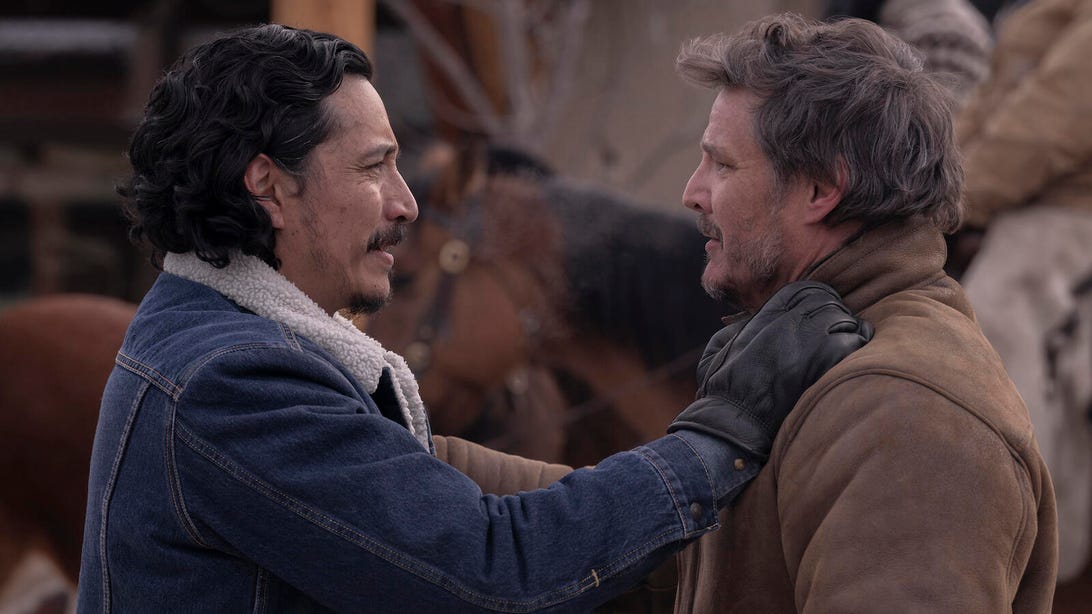
Gabriel Luna and Pedro Pascal, The Last of Us
Liane Hentscher/HBO"Kin," like The Last of Us' fourth episode, "Please Hold to My Hand," feels like a break before we get to the good stuff. What this episode does have going for it is the return of Gabriel Luna's Tommy, whose reunion with Joel gives the episode its emotional core as Joel and Ellie arrive at his commune in Wyoming. Pascal gets to show off his talent for emotional monologuing here, as an overwhelmed Joel begs the younger, stronger Tommy to help escort Ellie the remainder of the way the Fireflies, but it ends up feeling too showy for such a closed-off character. Bringing the brothers back together offers a necessary respite from the darkness, but as a whole, "Kin" drags, feeling like too much of a "home base" video game moment as we watch Joel and Ellie get a handful of literal item upgrades. Still, it's not all a slog: Ellie calling the Diva Cup she's provided with "gross" is an immediately perfect character beat. -Allison Picurro
More on Episode 6: Read our interview with Gabriel Luna
8. "Please Hold to My Hand" (Episode 4)
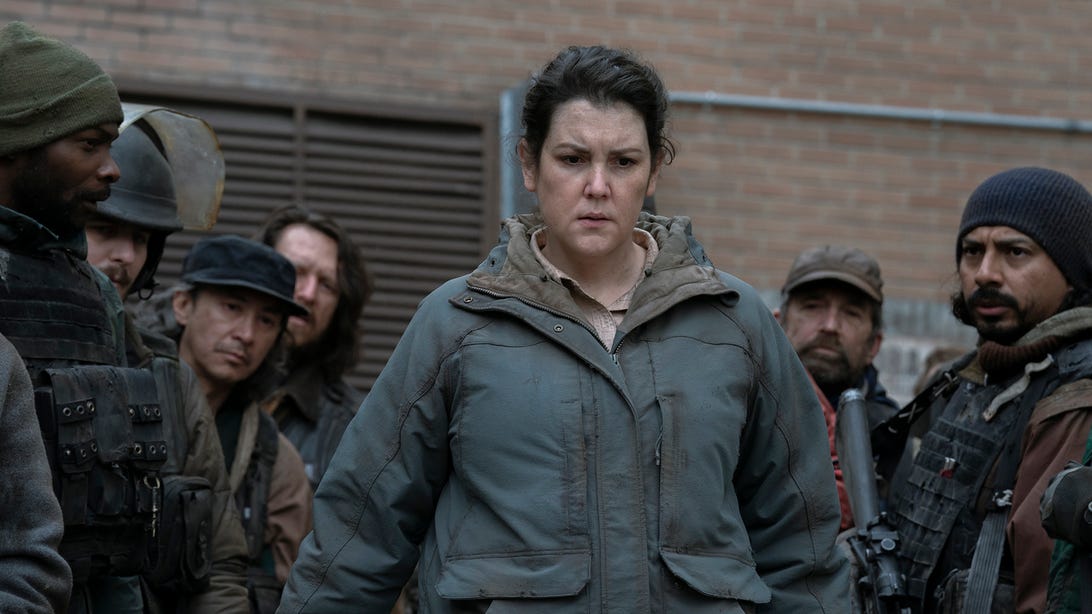
Melanie Lynskey, The Last of Us
Liane Hentscher/HBOThere were a few things working against "Please Hold to My Hand." First, it came after the internet-shattering high of "Long, Long Time," widely considered to be the series' finest hour (but was it ours!?!?!?). Second, it was the only episode of the season that was definitely the front end of a two-part story, meaning it had lots of setup to do while the payoff came the week after. And third, that awkward title! Ick. The good thing is it gave us a better picture of this world teetering on collapse, with FEDRA losing Kansas City to a rebel faction led by Kathleen (Melanie Lynskey), and hinted at Ellie's hardening and her use of violence. But that wasn't enough to put the episode in the top half of the best episodes of the season. This one was homework. -Tim Surette
More on Episode 4: Read our recap
7. "Infected" (Episode 2)
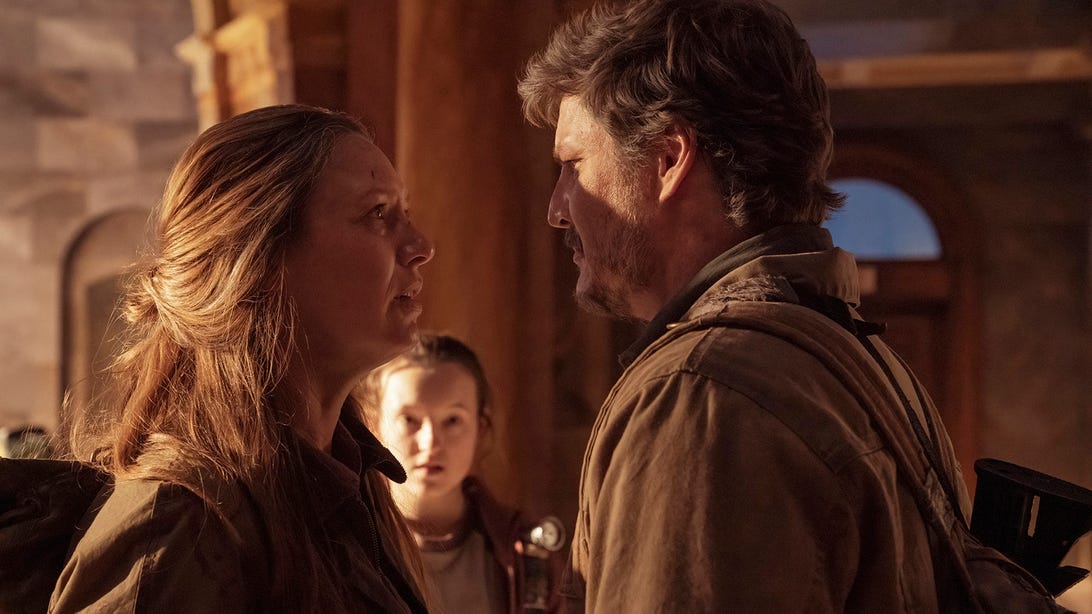
Anna Torv and Pedro Pascal, The Last of Us
HBOThe second episode of the series wraps up the show's Boston era as Joel and Tess (Anna Torv) reluctantly shepherd Ellie across the city. Like other episodes on the lower end of this list, it's more of a bridge between chapters than a chapter on its own, and The Last of Us is so obviously itching to be the Joel-and-Ellie story that Tess' death is easy to see coming even if you don't know the game. But "Infected" does find two ways to set itself apart. First, it introduces Clickers, an advanced and genuinely creepy stage of infection. Second, and far more importantly, it lets Anna Torv go wild. When Tess is bitten, marking the show's first major sacrifice, her sendoff is furious, hopeful, disgusting, and romantic at once. She leaves The Last of Us in a literal blaze of glory with death at her lips and fire in her hands. It's very cool. -Kelly Connolly
More on Episode 2: Read our interview with Anna Torv
6. "When We Are in Need" (Episode 8)
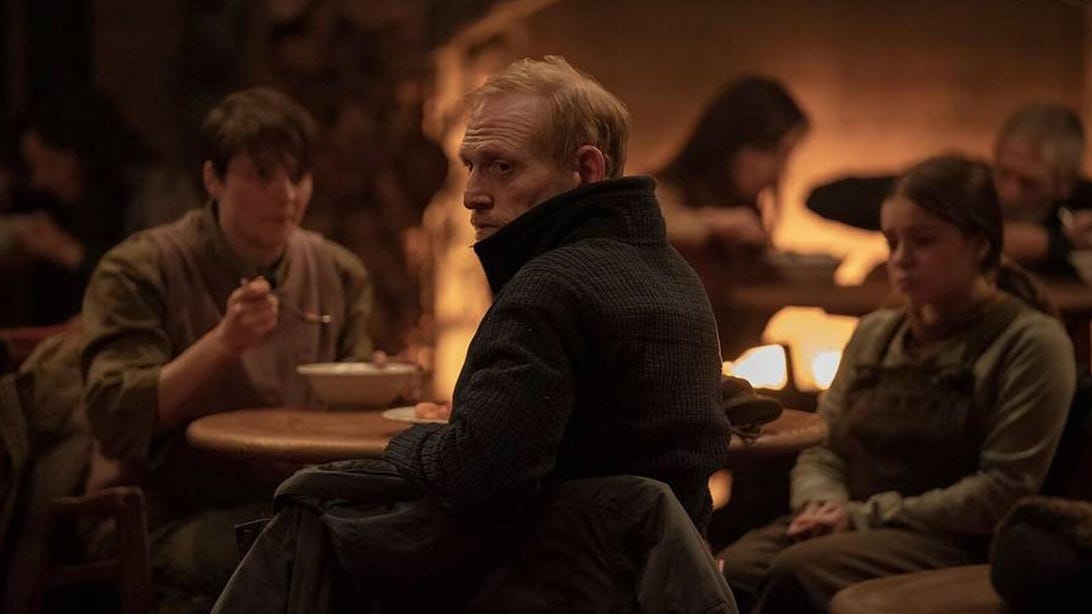
Scott Shepherd, The Last of Us
Liane Hentscher/HBOI lobbied for this episode to be a little higher in our rankings, but mostly because I belong to a subset of The Last of Us fans who liked the game for its horror and action elements, something the show was surprisingly lacking. But of all the hours of the show, this is the most frightening front to back. A simple tale of "some people are bad," "When We Are in Need" is the opposite of the (very good) mall-centered flashback episode that came before it; it's lean on story and character relationships but high on thrills as Ellie gets captured by a zany religious cult of cannibals, led by Preacher David (Scott Shepherd). There's little that moves the story and Joel and Ellie's bonding forward — Ellie cares for Joel, Joel gets better, Joel finds Ellie — but even if you knew Ellie wasn't going to be chopped up for dinner on that butcher block, you still tensed up. Crazy religious man-eaters aren't anything new in zombie stories, but no one's ever going to get sick of seeing them get what's coming to them, and when Ellie goes hyper-stabby on David's face while the cafeteria burns down behind her, it's one of the rare "Yay!" moments of the season, even as it comes at the cost of the last of Ellie's innocence. -Tim Surette
More on Episode 8: Read our recap
5. "Look for the Light" (Episode 9)
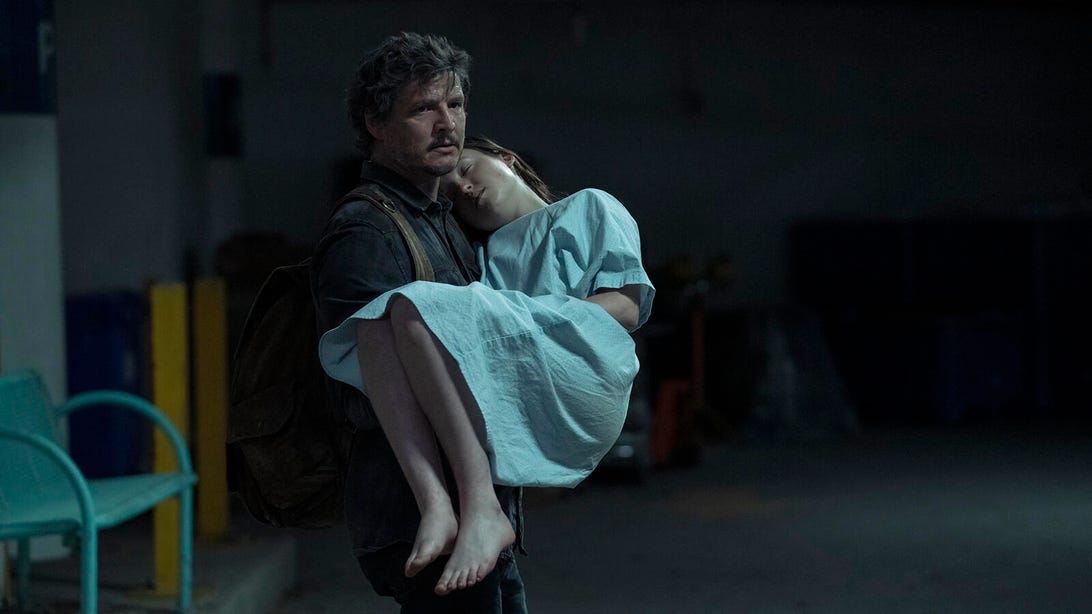
Pedro Pascal and Bella Ramsey, The Last of Us
Liane Hentscher/HBOThe first season finale of The Last of Us falls at the dead middle of this list for a reason: It's got interesting flaws. "Look for the Light" brings Ellie and Joel's search for the Fireflies to a sudden conclusion — the Fireflies find them — then speeds through a series of massively consequential choices without coming up for air. The Fireflies' first move is to prep Ellie for a surgery that will definitely kill her in the name of finding a cure; in response, Joel's first move is to kill everyone at the hospital to keep Ellie safe, even if it means sacrificing humanity's shot at that cure. In the video game, players are implicated in Joel's extreme violence because they are forced to choose it along with him. The TV series can't be visceral in the same way, so it tries to replicate that shock with speed, but the pacing is rushed and disorienting in a way that dulls the impact of Joel's murder spree. (Video game-y staging doesn't help.) And yet the fact that no one stops to chat is the point: Killing is Joel's first instinct. It might be the Fireflies', too. The Last of Us needs what the season finale has — morality murky enough to cast its hero in a new light — and the final scene ends with a satisfying thud. Still, it's a good idea strangely executed. -Kelly Connolly
More on Episode 9: Read our interview with Merle Dandridge
4. "When You're Lost in the Darkness" (Episode 1)
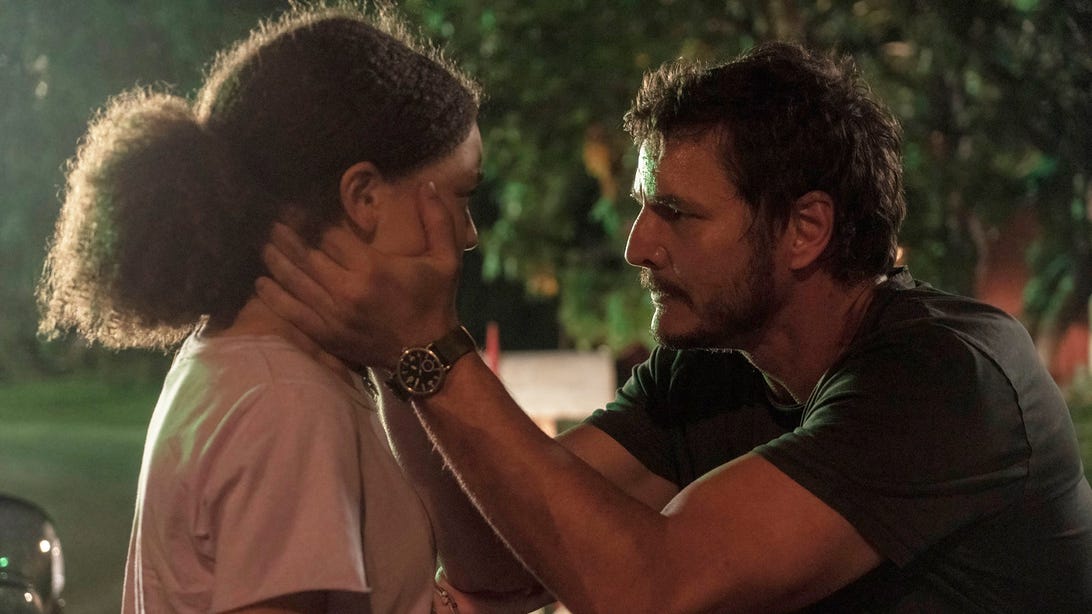
Nico Parker and Pedro Pascal, The Last of Us
HBOLet's address the obvious: It's bold to stack the first and last episodes back to back — they're almost impossible to compare considering how much every single thing about the series changes in between. But we're giving "When You're Lost in the Darkness" a slight leg up because of the way it pulls off the difficult task of setting everything up without making us feel like we're watching everything get set up. Its beauty lies in the details: that chilling cold open in which two scientists (John Hannah and Christopher Heyerdahl) discuss the possibility of a global pandemic on a talk show in the '60s; those few glimpses at the gentle simplicity of Joel and Sarah's (Nico Parker) life in Texas; the mass chaos of the first moments of the virus spreading through Texas; the choice to end on a well-placed Depeche Mode needle drop. Parker's performance as Sarah, whose vibrancy so much of the success of the series rests on and whose memory presides so heavily over the rest of the season, would even be enough to justify the pilot's placement on this list. It gave the series a necessarily strong and striking start, establishing an entire world with the knowledge that it would all be torn apart before the episode ends. -Allison Picurro
More on Episode 1: Read our interview with Pedro Pascal and Nico Parker
3. "Left Behind" (Episode 7)
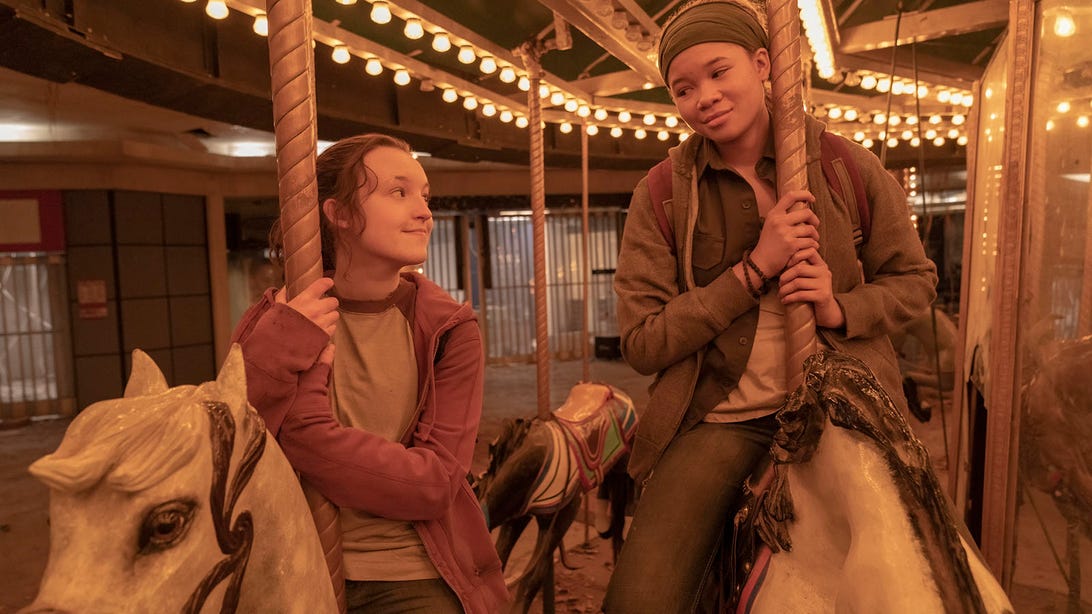
Bella Ramsey and Storm Reid, The Last of Us
HBOWe've reached the boss-level The Last of Us episodes. Any one of the top three on this list could make a claim to the No. 1 spot, and we debated them all. "Left Behind" is a late-season mirror to "Long, Long Time," this season's other queer love story about two characters choosing to die together, but this time, one of them doesn't die. Ellie's flashback to her doomed final adventure with her crush and best friend, Riley (Storm Reid), is a bittersweet lesbian coming-of-age tale, complete with the grungy remains of 2003 mall culture rendered in loving-yet-horrifying detail. We know the end before it begins — Riley and Ellie are bitten; Ellie survives and is forced to kill Riley when she turns — but while other episodes this season tried and failed to make death a surprise, here the show leans into that dread and lets it color the story. The end of "Left Behind" is beautifully edited, cutting abruptly back to Ellie in the present as she fights to save Joel from dying too. What this episode gets is that being a teenager always feels apocalyptic. -Kelly Connolly
More on Episode 7: Read our recap
2. "Long, Long Time" (Episode 3)
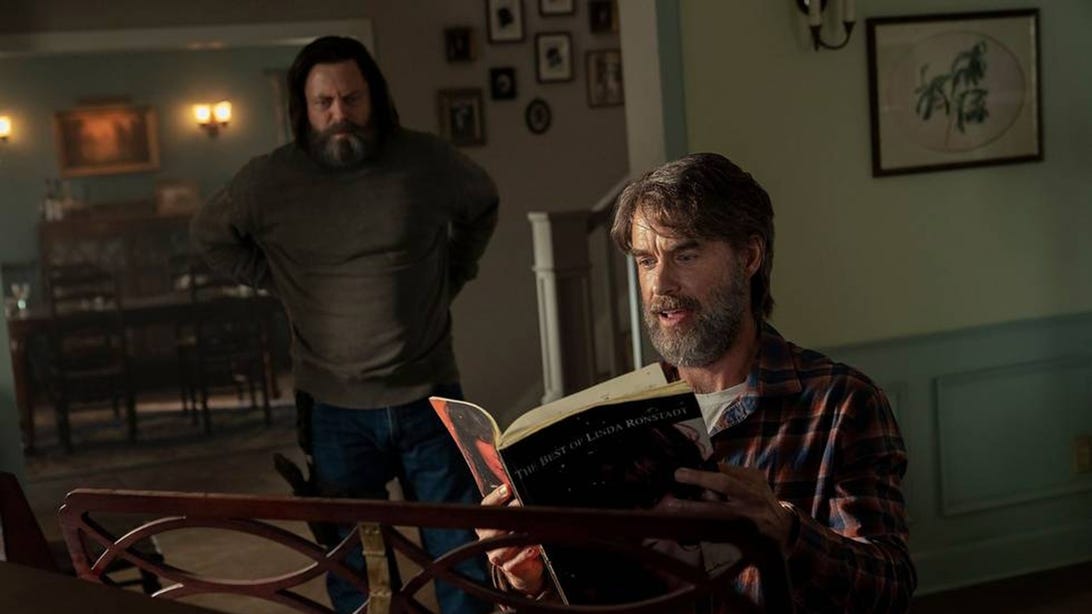
Nick Offerman, Murray Bartlett, The Last of Us
HBOEasily the toughest episode to place (we knew it would be top 3, but where?), "Long, Long Time" launched The Last of Us into "subject of online discourse" status, which is a feat in itself. Ignoring that, though, the series' third hour marks the first major diversion from the game, narrowing its focus down to just two characters, Bill (Nick Offerman) and Frank (Murray Bartlett). We meet Bill as a doomsday prepper whose prepping finally comes in handy when the virus ravages the U.S. — he's alone and lonely, though he doesn't really care to acknowledge it until he meets Frank by chance. The two create a private haven for themselves, tucked away from the dangers that lie outside Bill's electric fence as they grow older together; they make friends with Joel and Tess, they giggle like kids over their first taste of strawberries in years, they protect each other when the safety of their life is threatened. How rare it is to see gay men over 50 on TV in general, falling in love and navigating what it means to do so in a broken world, making the fact that they get to dictate their own endings feel even more meaningful. (The AIDS parallels are never explicitly acknowledged, though the subtext looms heavily.) By the end, which reminds us that love was enough to save Bill and Frank but not enough for Joel to save Sarah and Tess, you're left marveling at how one episode could pull off so much. -Allison Picurro
More on Episode 3: Read our reaction
1. "Endure and Survive" (Episode 5)
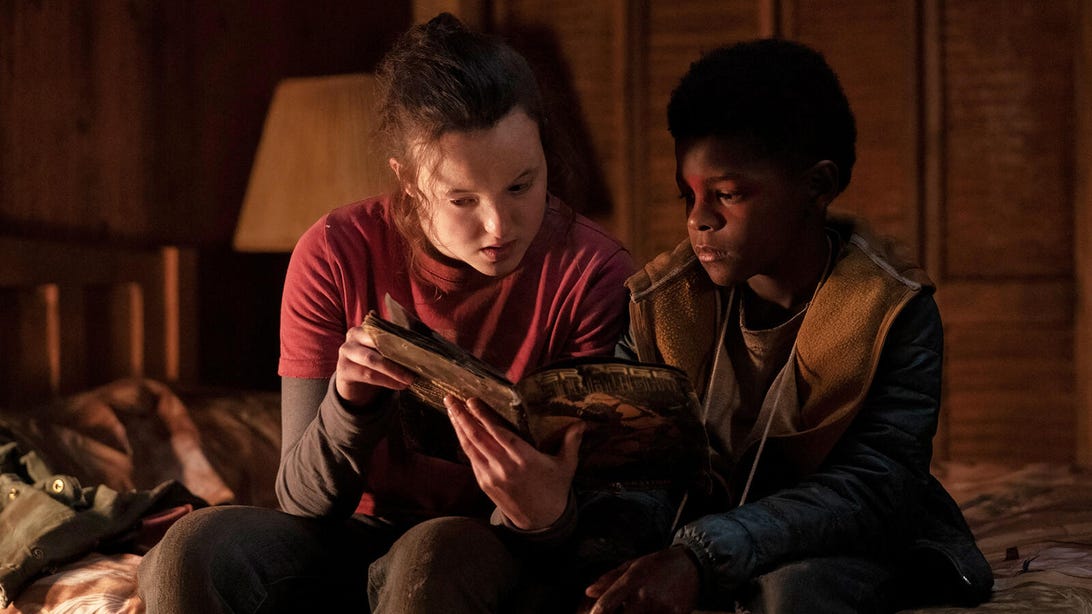
Bella Ramsey and Keivonn Woodard, The Last of Us
Liane Hentscher/HBOWith apologies to "Long, Long Time," "Endure and Survive" was the best episode of the season because it was the only episode to fully embrace everything that The Last of Us should be. Huge action! Big relationship building! Child fungus zombies! Getting to know tertiary characters and then watching them die! The second half of a two-part arc that began with Melanie Lynskey's Kathleen on an obsessive hunt for Henry (Lamar Johnson) and Sam (Keivonn Woodard) properly introduced us to the duo, who were a parallel to Joel and Ellie and foreshadowed problems they would face later in the season. The beautiful, quiet moments of two kids trying to have a normal playdate in a fungal apocalypse were balanced out by the season's biggest and most expensive action sequence (remember when that guy got his head ripped off?), and the shocking and sudden deaths of Sam and Henry cap off an episode that is 100% The Last of Us, through and through. And I know I already apologized to "Long, Long Time," but here's more: Sorry to Murray Bartlett and Nick Offerman — who were very, very good! — but Lamar Johnson delivered Season 1's best guest star performance. -Tim Surette
More on Episode 5: Read our interview with Lamar Johnson